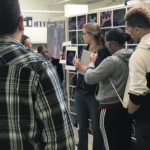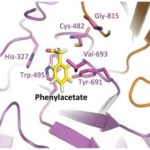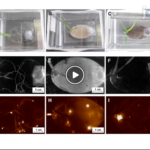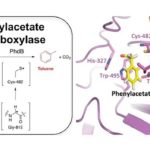 The 7th Annual East Bay STEM Career Awareness Day took place on April 26 at Wareham Development’s Aquatic Park Center in West Berkeley, home to Biosciences Operations @ Berkeley and several Area research groups. The event, organized by the Institute for STEM Education housed at California State University East Bay, had support from Berkeley Lab and several East Bay-based businesses.
The 7th Annual East Bay STEM Career Awareness Day took place on April 26 at Wareham Development’s Aquatic Park Center in West Berkeley, home to Biosciences Operations @ Berkeley and several Area research groups. The event, organized by the Institute for STEM Education housed at California State University East Bay, had support from Berkeley Lab and several East Bay-based businesses.
Biosciences Area FY18 LDRD Projects
The projects of 13 Biosciences Area scientists and engineers received funding through the FY18 Laboratory Directed Research and Development (LDRD) program. These projects span a diverse array of topics and approaches including the study of microbiomes in relation to patterns of mutualism, crop productivity, and gut health; synthetic biology for engineering biosurfactant production and energy conversion pathways; and the application of technologies such as machine learning, high-resolution optical microscopy, and single-cell transcriptomics. Together, these efforts account for 18.75 percent of the $20 million allocated. Lab-wide, 74 projects were selected from a field of 215.
Northen Lab Publishes Video Protocol for Building EcoFABs
Scientists in Trent Northen’s groups in Environmental Genomics and Systems Biology (EGSB) and Metabolomics Technology at the DOE Joint Genome Institute (JGI) have published detailed video protocols for creating fabricated ecosystems, or EcoFABs, in the Journal of Visualized Experiments (JOVE). These laboratory-scale controlled habitats, constructed using widely available 3D printing technologies, enable mechanistic studies of plant-microbe interactions within specific environmental conditions. The published protocols serve as a starting point for other researchers, ideally helping to create standardized experimental systems for investigating plant-microbe interactions. The video component of this article can be found here.
Computing Sciences and Biosciences Hold Machine Learning Workshop
The Lab’s Computing Sciences and Biosciences Areas jointly held a week-long workshop focused on machine learning in data science, the goal of which was to build bridges through a common foundation in statistical computing. Thirty attendees from Biosciences, Computing Sciences, and Lab IT received hands-on training provided by Data Incubator before engaging in a “hackathon” to apply the techniques to relevant science problems and data sets.
JBEI Enzyme Discovery Enables First-Time Microbial Production of the Octane Booster Toluene
 Researchers at the Department of Energy’s Joint BioEnergy Institute (JBEI) and Lawrence Berkeley National Laboratory (Berkeley Lab) have discovered a new enzyme that will enable microbial production of a renewable alternative to petroleum-based toluene, a widely used octane booster in gasoline that has a global market of twenty nine million tons per year.
Researchers at the Department of Energy’s Joint BioEnergy Institute (JBEI) and Lawrence Berkeley National Laboratory (Berkeley Lab) have discovered a new enzyme that will enable microbial production of a renewable alternative to petroleum-based toluene, a widely used octane booster in gasoline that has a global market of twenty nine million tons per year.
- « Previous Page
- 1
- …
- 20
- 21
- 22
- 23
- 24
- …
- 37
- Next Page »
Was this page useful?







